Headmistress Committed to Primary School Education for Decades
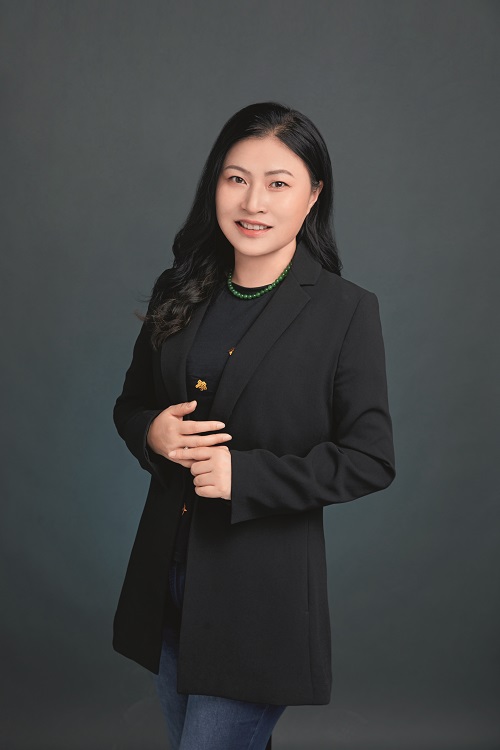 |
| Wu Rongjin |
"Luwan No. 1 Central Primary School plays a leading role in shaping the learning environment in the 21st century, and it incorporates sciences and new technologies with students' education on social cognitive skills and sentimental values," Andreas Schleicher, Director for the Directorate of Education and Skills at the Organization for Economic Cooperation and Development (OECD), wrote in a book, World Class: How to Build a 21st-century School System. He once visited the school, in the Huangpu District of Shanghai, where he met the headmistress, Wu Rongjin. She has worked in education, and she has made endless efforts in the pursuit of her education dream, for the past 28 years.
Aspiring to Teach
When Wu was a child, she often pretended to be a teacher, and she used a tiny blackboard, bought by her father, to teach her "student" — her doll.
Wu was always the last student in her class to be picked up after school, because her parents were often stuck at work. A teacher would stay with Wu until her parents arrived.
Wu began reading the notes her teachers left in her exercise books when she was in middle school. In fact, reading the teacher's notes was the first thing she did when she received an exercise book.
At that time, Wu aspired to be a teacher, and to be a positive influence on her students. In 1994, she chose to become a teacher at Luwan No. 1 Central Primary School, after she graduated from the then-Shanghai Teachers Training College.
Inspired by Cheng Hua, then-head of Luwan No. 1 Central Primary School, Wu was determined to forge ahead, and to write a glorious chapter in the promotion of basic education. She has said she benefited greatly from the love, benevolence and encouragement shared by Cheng.
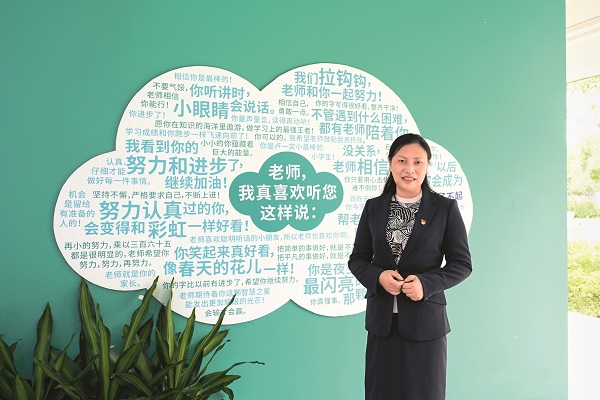 |
| Wu Rongjin, headmistress of Luwan No. 1 Central Primary School |
Original Aspiration
Luwan No. 1 Central Primary School boasts incomparable revolutionary resources, and rich historical resources, to help its students learn about the history of the Communist Party of China (CPC), because the school is adjacent to the Memorial for the Site of the First National Congress of the CPC.
During a visit to the memorial, in 2005, Wu noticed some of the students were not interested in the guides' narration.
Therefore, Wu arranged for the students to revisit the memorial, and to draft their own tour and narration script. Wu wanted to help the students learn about the revolutionary tradition in China, and to cherish their current happy lives.
A group of the students began working as tour guides — especially for visitors their own age — at the memorial. The students' vivid narrations have received warm applause, and high recognition, from visitors of different ages, and especially from children their age.
During the past 17 years, Wu has worked with the students (tour guides) to organize inspection tours, write child-oriented narration scripts, and explore new forms of narration, in Mandarin, the Shanghai dialect and English.
Many former members of the teenage narration team have continued participating in relevant narration activities, even though many of them are now studying in middle schools or universities, or have even started building their careers.
Hu Qicheng, now a middle school student, says he is often stopped on the street and told, "I remember you. You were a member of the teenage narration team at the memorial."
Xiao Lin, another former member of the teenage narration team, is studying abroad. She says she can still recite all of the narration scripts.
Wu says planting a seed of faith (in the revolutionary traditions) in the hearts of children is the holy mission and responsibility of teachers.
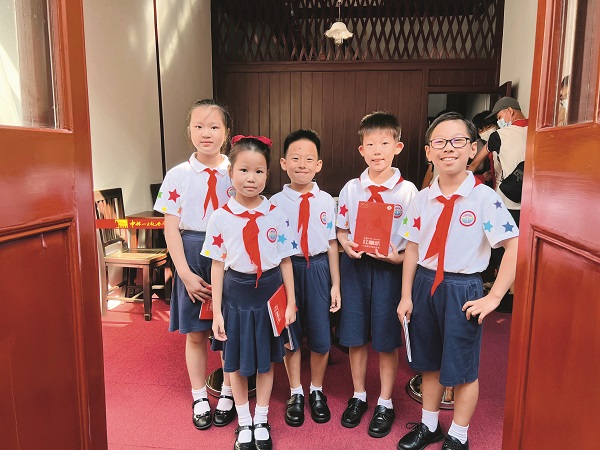 |
| Members of the teenage narration team pose for a photo. |
Sentimental Education
Wu and her colleagues began providing their students with sentimental education in 2004, because they firmly believe that all-round development of personal character and sentiment is compulsory for young students.
A weekly course, offered by Wu, became popular with students because the course was effective and useful in guiding them to think positively and improve their personal skills, as well as improve their competence in interpersonal communications.
Wu eventually integrated her sentimental education with education on moral grounding, intellectual and physical ability, aesthetic sensibility and work skills.
Wu has conducted that course, which stresses the cultivation of a healthy sentiment and interactive communications between students and teachers, for the past 18 years.
In fact, Wu has not limited sentimental education to the classroom. For instance, she always stands at the school's entrance to greet the students; and, she advises students not to splash water, from their umbrellas, on people during rainy days. Wu hopes the students will learn to show due respect for the feelings of other people.
Moreover, Wu has encouraged her students to speak with their teachers about their problems and difficulties they face in their daily lives.
Running a school filled with love and being a benevolent teacher are Wu's original aspirations as a teacher — and a principal. Her greatest desire is to guarantee every child's happy growth and physical and mental health.
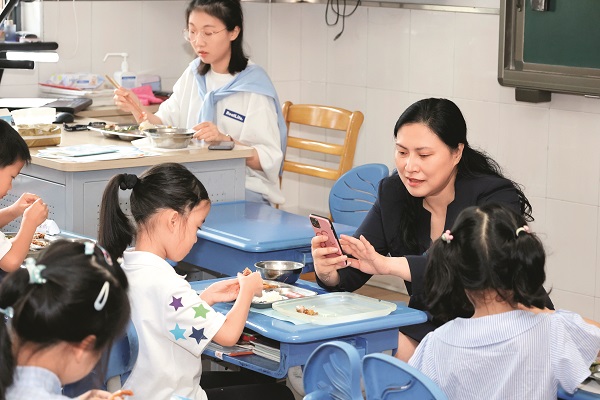 |
| Wu Rongjin takes photos for students while they are eating. |
Unremitting Endeavors in Education Reform
As early as 2009, Wu started promoting the informatization of education in Luwan No. 1 Central Primary School. At that time, the introduction of tablets in classrooms by Wu stirred a heated debate among teachers. However, she held firm, and she argued the application of information technology will help teachers provide instruction tailored to the student's individual needs and abilities.
Wu was eventually proven right, and therefore became a national pioneer in the adoption of online classes. Since then, she has continued to explore in-depth integration of information technology and education, with the aim of utilizing the latest technologies to conduct education in suitable ways for all students, and to promote students' all-round development.
With the support of modern technologies, the school has closely monitored the state of students' learning, and advised teachers to make necessary adjustments in content and lesson delivery.
Statistics indicate students in Luwan No. 1 Central Primary School have performed well in their academic studies, and that they have shown strong enthusiasm for learning amid a persistent reduction in their academic burdens over past decades.
Both Wu and the school have been recognized — with many awards — for implementation of in-class education informatization over the years.
Furthermore, Wu helped popularize the innovative online-class mode in more than 250 schools in Qinghai, Shaanxi and Guizhou provinces, for the purpose of narrowing the gap in education between East China and underdeveloped areas of the country.
In 2021, Wu was honored as a Role Model of the Times, by the Publicity Department of the CPC Central Committee, and as a National March 8th Red-banner Holder, by the All-China Women's Federation (ACWF), for her decades-long dedication to education.
Wu says her strong sense of responsibility has sustained her commitment to education over the decades.
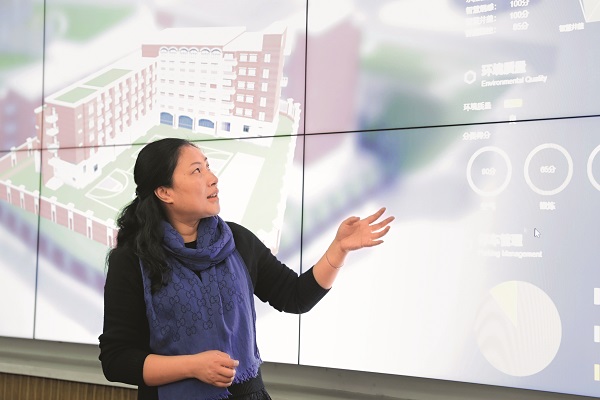 |
| Wu Rongjin introduces the construction of digital transformation school. |
Photos Supplied by the Interviewee
(Women of China English Monthly January 2022 issue)
Please understand that womenofchina.cn,a non-profit, information-communication website, cannot reach every writer before using articles and images. For copyright issues, please contact us by emailing: website@womenofchina.cn. The articles published and opinions expressed on this website represent the opinions of writers and are not necessarily shared by womenofchina.cn.

 京公网安备 11010102004314号
京公网安备 11010102004314号